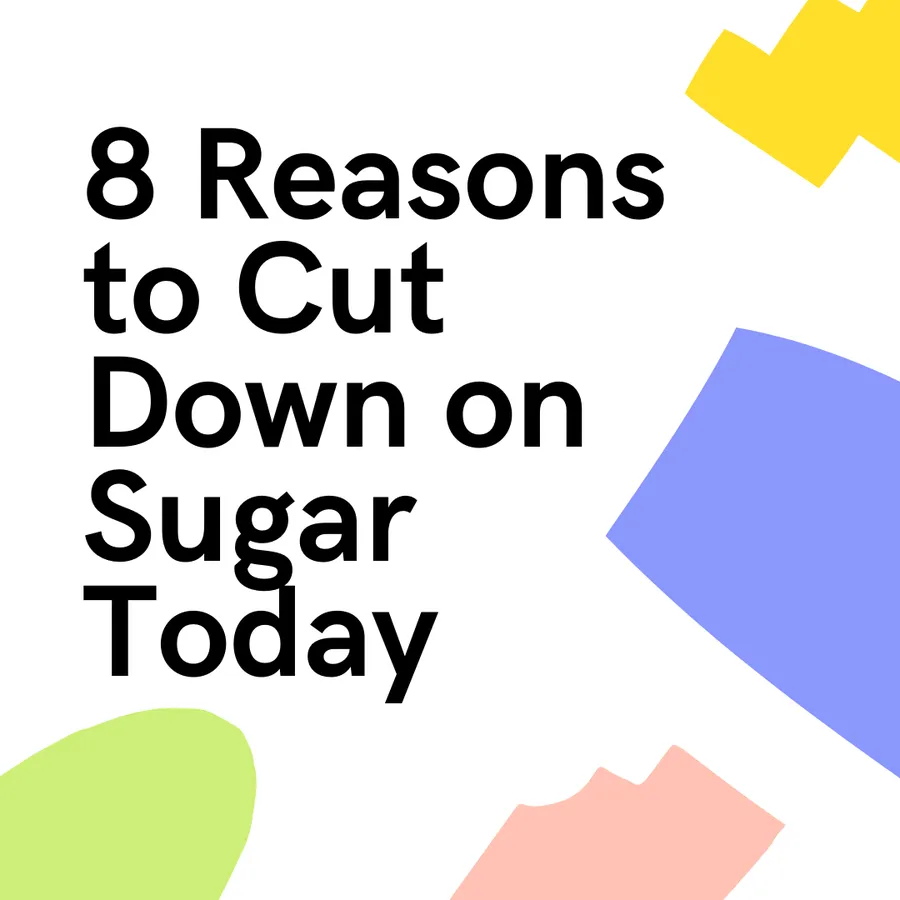8 Reasons to Cut Down on Sugar Today
5 minuteRead

Sugar is found in lots of foods but high sugar consumption actually isn't good for us. The most common sources of added sugars include soft drinks, cakes, pies, chocolate, fruit drinks and desserts. Just a single can of cola can contain up to 7 tsps of added sugar, while an average-sized chocolate bar can contain up to 6 tsps.
Why is sugar so hard to quit?
There's a reason why sugar is hard to shake: for one, it's delicious, but sugar also causes the opioid receptors in your brain to activate, which triggers your neurological rewards system to flare up. In other words, sugar makes you feel good emotionally, despite the negative side effects excess consumption can lead to, like headaches, energy crashes, and even hormonal imbalances.
The array of studies reporting the negative implications of added sugar led to WHO making a proposal to revise their added sugar recommendations in 2014. The organization issued a draft guideline stating they would like to halve their recommended daily free sugar intake from 10% to 5%. Added sugars are simple carbohydrates. This means they're digested fast and enter your bloodstream quickly, providing that familiar rush. But once that shot of sugar is metabolized, you're in for a crash. You may be riding this energy roller coaster all day, since added sugar is hiding in countless sneaky places—even salad dressing and barbecue sauce. Here are 8 reasons why you should cut down on sugar:
1. It Affects Your Skin.
Excess sugar consumption raises insulin levels in the bloodstream, which has been found to enhance the activity of oil glands in the skin and inflammatory processes that produce acne and pimples. Although it is sometimes overlooked, it is crucial to remember that the skin is an excretion organ and thus a reflection of what is going on inside the body, particularly the balance of bacteria in our gut. Sugar consumption can induce a disruption in the microbiota or poor gut health, both of which can have serious consequences for the skin. Not to add, sugar and processed carbs have been linked to inflammation and hormone imbalances, which can lead to skin problems including rosacea, acne, and premature ageing. Furthermore, sugar bonds to collagen protein in a process known as glycation, resulting in a new molecule known as AGEs. AGEs have been shown to break down elasticity and damage collagen in the skin, producing wrinkles and premature ageing, making it one of the top reasons to give up sugar.
2. It Causes Problems with Hormones and PCOS.
The relationship between sugar consumption, overall carbohydrate intake, and hormonal activity has been discovered in research on polycystic ovarian syndrome (PCOS). Eating too much sugar can mess with your blood sugar, and your blood sugar is linked to hormone activity in your body. Insulin resistance has been identified as one of the root physiological abnormalities in most, if not all, cases of PCOS.
3. Hurts the Immune System.
When we eat something sweet, the pancreas releases insulin to lower blood sugar levels and transfer it to our cells. Insulin limits the production of human growth hormone, which suppresses the immune system and makes us vulnerable to infections and viruses. Excess sugar consumption can "weaken" the immune system over time, making us more susceptible to cold and flu season, and in the long run, making us more susceptible to disease, auto-immune disorders, and (worst case scenario) cancer.
4. It Has an Effect on Your Mental Health.
Sugar causes an increase in blood sugar as well as feel-good serotonin levels in the brain. When the sugar leaves our system, we have a "crash," which sets in motion a cycle of cravings and bingeing in both our bodies and minds. Not only can too much sugar affect our insulin, which in turn affects other hormones and neurotransmitters (including dopamine), but our stomach is also known as the "second brain." There is a direct link between our mental health and our gut health, and your gut houses 80 percent of your serotonin. As a result, sugar overconsumption not only affects our energy levels, which in turn affects our mood, but sugar also has a long-term effect on our gut health, which has a direct impact on mood, as well as anxiety and melancholy.
5. It Depletes Your Energy
Foods high in added sugar elevate blood sugar and insulin levels quickly, resulting in a surge of energy. This increase in energy levels, however, is just temporary. Products high in sugar but low in protein, fibre, or fat provide a short burst of energy followed by a significant drop in blood sugar, a phenomenon known as a crash.
Constant blood sugar changes can cause significant energy fluctuations. Choose carb sources that are low in added sugar and high in fibre to avoid this energy-draining loop. Another wonderful strategy to keep your blood sugar and energy levels constant is to combine carbs with protein or fat.
6. It Affects Your Cholesterol Levels.
High sugar consumption lowers HDL cholesterol levels, which assist remove LDL, or "bad" cholesterol from artery walls, and has been shown to raise triglyceride levels, a form of fat found in the blood that increases the risk of heart disease.
Artificial sweeteners should also be avoided at all costs, despite the fact that they are not made from sugar. These sweeteners are made up of a plethora of chemicals, have no nutritional value, and come with a slew of negative side effects of their own. It's worth noting that natural sugar found in fruits has none of the drawbacks that refined sugar has.
It may be difficult at first to eliminate refined sugar and stick to a low glycemic cleanse or diet plan, but you'll soon notice the benefits to your mind, body, and general well-being.
7. It Causes Your Teeth To Rot.
Sugar breaks down into acidic bacteria in your mouth, causing your teeth to disintegrate and be damaged. A high sugar intake over time will cause more of these bacteria to become lodged within your mouth, speeding up the incidence of tooth decay. Sugary foods, including fizzy drinks and sweets, should be avoided to keep your teeth and gums safe from this bacteria.
8. It is Linked to the Development of Heart Disease.
When it comes to heart health, saturated fats and cholesterol are commonly talked about, but in reality, it's sugar that we should be concerned about. Excess consumption of refined sugars, rather than saturated fats, is now widely acknowledged by the medical profession as the leading cause of heart disease.
Although the specific mechanism by which sugar impacts heart health is unknown, it appears to have multiple indirect links, including high blood sugar, high cholesterol, and high blood pressure, all of which have been related to heart disease, making it even another compelling reason to give up sugar.
Write, Record and Answer! Consume Unlimited Content! All you need to do is sign in and its absolutely free!
Continue with one click!!By signing up, you agree to our Terms and Conditions and Privacy Policy.



















